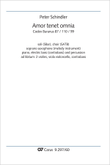Chorus, orchestra, solo voices (Soli SBar, S-Sax (Melodieinstr in C), Pfte, Jazz-Bass (Cb), Perc, [2 Vl, Va, Vc, Cb]) - Grade 3
SKU: CA.929810
From: Perpetuum mobile - Songs from the Codex Buranus. Composed by Peter Schindler. Full Score. Carus Verlag #929810. Published by Carus Verlag (CA.929810).
ISBN 9790007329631. 8.27 x 11.69 inches.
Composer Peter Schindler on this separate edition from "Perpetuum mobile":
The text "Estuans intrinsecus" (no. 191 in the Codex Buranus) is attributed to a poet whose name has come down to us as Archipoeta. The "arch-poet" was born between 1125 and 1135 and died some time after 1165. Archipoeta was an important Latin-language poet of the twelfth century and a representative of goliardic or wandering poetry. His songs were widespread in the Middle Ages. To this day "Estuans intrinsecus" (Blazing within) is one of the most famous secular texts in the Codex Buranus, where the original song is a whole twenty-five verses long! It imitates or parodies the form of confession, which is why it is also known as the vagrant's confession. It is a masterful poem that can be interpreted in many ways. Is the inner conflict the expression of someone in despair? Or do the verses reveal a free thinker in a cultivated, witty game where he wasn’t taking seriously the strict moral teachings of his time? Is it irony or honest remorse?
Conceived as a duet between man and woman, the flowing song is not self-accusing, but should be interpreted with the self-confident attitude, "It can't be bad to live my life according to my own nature." Centuries later, Lessing said: "It is no crime to have loved; it’s even less a crime to have been loved." And lyricist Bruno Balz, then an unknown world star, triggered a very similar discussion with his 1938 hit film "Kann denn Liebe Sünde sein?" (Can love be a sin?).








































